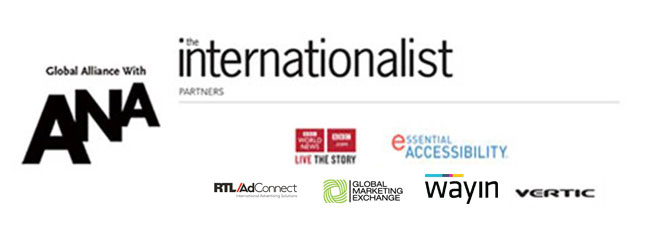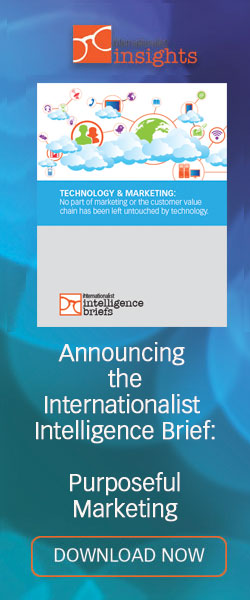

Manuel Reyes
Manuel Reyes is the founder of Cortex Media and has been providing media auditing and consulting services to top-tier advertisers in North America, Latin America, Europe, and Asia since 2001. Before that, he was Chief Executive of Starcom Latin America. He also led MediaVest's Latin America and US Hispanic divisions. Over the last 25 years, Manuel has held management positions at several agencies, advertisers, and media companies.
Cortex Media helps create a media value advantage for marketers. The company is recognized globally as a resource for balanced and independent viewpoints on key advertising media topics in US and worldwide-- from Media Performance Optimization to Digital Media Cost Benchmarking and Review to Financial Compliance and Transparency to Agency Management and Evaluation.
See the current issue
of The Internationalist magazine
Find out how to sponsor an issue of Trendsetters
|
|
If you have spotted a trend or given a recent presentation on a global issue, please tell use and don’t forget a photo of yourself!

To submit to Trendsetters, contact me at: linkedin.com/in/deborah-malone-ab5897,
The Internationalist group on LinkedIn:
https://www.linkedin.com/groups/2560753/or at Twitter--@DMaloneIntl
TRENDSETTERS: Cortex Media's Manuel Reyes Discusses the Latest Threat to Trust between Advertisers & Agencies
The Internationalist Trendsetters is written by Deborah Malone, founder of The Internationalist.
As the founder of media auditing and consulting services firm Cortex Media, Manuel Reyes understands the critical issues at the heart of media performance and compliance. While trust and transparency have certainly been among top industry concerns for the last several years, he sees another threat that can affect relationships between advertisers and agencies: opt-in, non-disclosed media transactions. He describes this as "media buys that exist between a rock and a hard place."
Reyes provides background on this new concern and offers several considerations for advertisers.
He acknowledges that agencies have been placed under tremendous pressure by continual reductions to agency fees and commissions, increased payment terms, and a rise in operational complexity due to digital media. "Not surprisingly," he says, "they have had to become very creative in developing alternative revenue models, many of which have led us down the path of eroding trust between advertisers and agencies."
Originally, agencies resorted to simple rebates from media vendors based on overall annual volume. These programs were commonly referred to as AVBs (Agency Volume Bonuses), rebates, rappels, sur-commissions, etc. Reyes explains, "Agency contracts were carefully crafted so that the client would be entitled to any discounts, bonuses or other benefits based on the client's investment only. This sounded like fair language, but it allowed agencies to keep anything that was derived on "overall" agency volume. Many advertisers have closed this loophole, but others have appeared.
Trying to find other sources of revenue, agencies began selling services to media vendors. This came with two problems. First, there could be potential conflicts of interest since the media were now vendors and customers at the same time. Secondly, there has been a concern that many of these services were sold at a "premium' -- for much more than they were worth. This provided the agency with a backdoor to rebates in another form. Again, language was added to agency contracts to limit this as much as possible."
Manuel Reyes notes that major shifts started to occur with the advent of programmatic media buying. "Agencies," he says, "began making large-scale use of undisclosed, non-transparent buying practices by promising media savings to advertisers, provided they opted in to this model. By doing so, advertisers waive audit rights and allow the agency to buy as principal. This prevents advertisers from seeing what is paid to media vendors, and it allows the agency to make an undisclosed margin on these transactions. Opt-in transactions allow the agency to be compliant with contract conditions and make a margin on transactions-- provided they get approval from their client."
He emphasizes that, initially, opt-in transactions were truly "opt-in" -- meaning the advertiser could decide to participate or not. "As long as the client went into these transactions understanding the consequences, they were entering into this at their own peril. The issues with these transactions are obvious: (1) The agency was now an advisor and a vendor at the same time, creating potential conflicts of interest. The advertiser could no longer trust that recommendations were in their best interest or instead to the benefit of the agency; (2) There now was potential for the agency to "comingle" their regular buys executed as "agent for a disclosed principal' (disclosed pass-through pricing) with their "principal' transactions designed to drive gains for the agency. This could result in a situation where the "agent" buys are at acceptable price levels while the "principal' buys receive significant discounts. This allows the agency to make a higher profit at the expense of the regular buys performed as "agent.'"
Reyes now outlines the next consequence of opt-in, non-disclosed media transactions: "As advertisers put their media agency accounts into review and agencies continue to promise huge savings, the delivery of these savings is now often contingent upon the use of opt-in buys. In short, some agencies are requiring advertisers to agree to opt-in transactions upfront-- as long as the agency is providing "equivalent' media as would have been purchased normally and offer a certain level of savings. Once this is agreed upfront in the contract, the advertiser is no longer in control of when opt-in buys are done and what gets purchased specifically. In other words, the agency is in full control of what gets purchased, how it gets purchased and how much margin they make."
In short, Manuel Reyes now believes that advertisers are truly between a rock and a hard-place when they decide whether to opt-in or not. "If they don't opt-in, they may forgo value in the short-term by not taking the "discounts" offered. If they do opt-in, they are encouraging the expansion of this practice, with all consequences involved. Either way, value that should have gone straight to the advertiser in the old days now stays at the agency. Media vendors don't care which pocket they get paid from as long as they make their numbers."
No wonder trust has been eroded.
Learn what advertisers should consider as they approach opt-in transactions:
According to Manuel Reyes, here's what advertisers should consider as they approach opt-in transactions:
- Make sure they are truly opt-in. Agency contracts should not include a contractual obligation requiring advertisers to "approve" these transactions if the agency says the media being proposed is "equivalent" to what they would buy as agent and/or supposed savings will be delivered.
- When negotiating savings guarantees, ensure these are not contingent on opting-in. Any additional "savings" from opt-in transactions should be on top. During agency pitches, agencies should be made aware from the start that any savings guarantees should not be tied to opt-in requirements.
- Set up clear internal procedures on how opt-in approvals should work. An agency should be required to provide a recommendation in advance with a clear rationale supporting the media being proposed, as well as an outline of savings against the same media being purchased through regular, disclosed, "agent" transactions. Advertisers should also limit approval authority to senior management who have a clear understanding of what is being approved and the issues involved with opt-in transactions. Training should also be provided to marketing, media and procurement personnel who have anything to do with these transactions.
- Understand the media agency landscape. Some agencies are very aggressive in pushing opt-in transactions. Other agencies also offer savings and efficiencies, but do not engage in this practice. There is choice in the market regarding this.
- Ensure you negotiate maximum audit rights regarding these transactions. At a minimum, the agency should report what they are charging you on a unit-by-unit basis, so you can evaluate if opt-in buys deliver savings vs. regular buys. Some advertisers are asking for caps on margins for these transactions with audit rights that allow them to verify this.
With everything going on, we agree with Reed Smith, General Counsel to the ANA, that 2019 should be The Year of the Audit.

